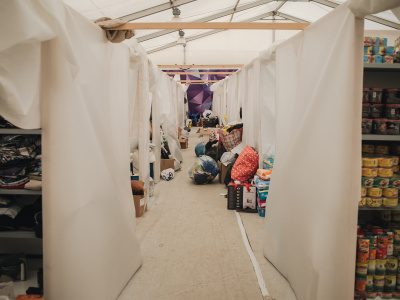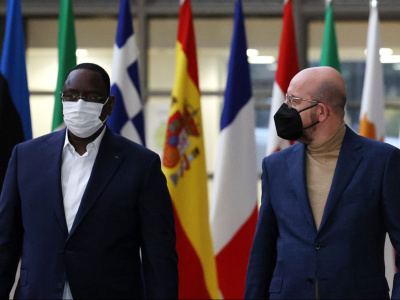
Why migration and mobility should – but probably won't – be at the heart of the EU-AU Summit
Migration is once again one of the more controversial items on the agenda of the long-awaited EU-AU Summit on 17 and 18 February in Brussels.
As African and European leaders are getting ready for the summit, the usual language of partnership and shared interests – found for instance in the European Union (EU)’s Africa strategy from 2020 – has once again resurfaced with much vigour and force. Yet, despite the rhetoric to transform migration cooperation with the African continent, it is quite unlikely that we will see real progress, as there are very few overlapping interests.
The EU’s vision on migration cooperation is skewed towards what Europe wants, with little space for African views and priorities. For the French presidency of the Council of the EU, migration is central – but when it comes to migration cooperation, we’re largely looking at renewed efforts on return and reintegration and a joint fight against people smuggling.
Incentives for better cooperation of partners on these aspects? A large amount of money for investment and cooperation projects, and much of it for migration governance. Legal routes? More of a side note and directed mainly at students (despite increasing voices from within the EU to offer more). Denmark’s announcement to aim for offshoring its asylum processing and its bilateral engagement with third countries to that end adds fuel to the fire. But while the EU wants to push for more cooperation on migration, African leaders have focused on other things in their preparation for the summit.
The African Union (AU) has shared its concerns that the approach of the EU and its member states is undermining its own attempts and frameworks, such as its efforts to promote the free movement of persons on the continent.
Meanwhile, the ones losing will be migrants. Efforts to strengthen migration governance have not adequately translated into better conditions and opportunities for mobility and migration between both continents, and not markedly improved the treatment of migrants, beyond political commitments to ‘do better’ and ‘work together’.
How can AU and EU policymakers move the discussion on migration forward together and overcome a fixation on the return and security-related aspects of migration only?
1. Prioritise a discussion on migration for economic and welfare purposes
When discussing migration, its economic aspects are rarely highlighted. Yet, migration and mobility are an important part of economic development and human welfare in both continents. The COVID-19 lockdowns that imposed restrictions on movements and mobility revealed the importance of migration to livelihoods in both Europe and Africa.
Across Africa, cross-border traders, seasonal workers, students and other migrant workers were unable to move in support of their livelihoods and send remittances. In European countries, lockdowns affected the availability of seasonal agricultural labour and low-skilled labour, resulting in shortages in the supply chain and staff shortages in essential sectors such as healthcare. African countries are well positioned to supply skills to meet European demographic needs and shortages. And some EU member states are increasingly looking at recruiting workers from Africa.
During and after the summit, discussions should focus on how migration governance and immigration systems can adapt to promote circular labour migration in particular sectors. Impetus for legal pathways can for instance revolve around the EU’s talent partnerships – a key initiative under the EU’s new migration and asylum pact. The AU and the EU should discuss how to expand the potential for both countries of origin and destination to benefit more from brain gain, circulation of talent, diaspora expertise and remittances for development. In these discussions, both the EU and the AU should take seriously existing concerns about the ‘loss of talent’ from African countries, the condition of migrant workers and the pressure on services in destination countries.
2. Focus on joint protection of migrants
The pandemic has again shed light on the substandard working conditions of African migrant workers within the African continent as well as in Europe, the Gulf and Middle Eastern countries. Both European and African countries need to do better to address such vulnerabilities of migrant workers. Protection and promotion of the rights of all types of migrants and refugees are central to the AU’s mandate and should be enforced from a joint continental standpoint.
Strategic partnerships like the EU-AU one offer an important framework to discuss and adopt practices to promote rights of migrant workers in destination countries. With EU border agency Frontex expanding its mandate, the EU’s push for increased cooperation between Frontex and security forces in African countries and existing questions around Frontex’ own role in migrant protection, there will be plenty to discuss in terms of how protection of migrants can be improved and monitored.
3. Discuss how the EU can offer coherent support to African regional integration
The AU is making efforts to promote the free movement of persons and mobility and goods on the continent. Examples are the AU free movement protocol and the agreement establishing the African Continental Free Trade Area (AfCFTA). These agreements seek to promote the mobility of persons and goods on the continent.
Yet, some African countries view migration and mobility as a security crisis. Increased military responses to migration and mobility, at times backed by EU support, have contributed to undermining regional measures to promote mobility and risks doing so at the continental level too. Framing migration and mobility as a security rather than a political, economic and social problem downplays the opportunities available through improved mobility on the continent. It also undermines the need for adequate migration policies to protect migrant rights.
Partnership discussions between the AU and the EU could tackle questions around the type of approaches and the entry points for the EU to effectively support difficult migration and mobility reforms in support of the free movement protocol on the African continent.
Better analysis of the actors and interests involved in migration governance will help identify approaches and initiatives that already receive some traction and can support the establishment of preconditions for stronger integration in the area of migration. The free movement process for instance can be more explicitly and organisationally linked to the AfCFTA process through a clear roadmap. EU support in this area will need to better navigate African political economy dynamics on migration, while respecting African ownership of the agenda.
This also includes more coherence concerning the EU’s policies affecting migration governance. The EU supports the implementation of the AU’s free movement protocol, but it is also adopting measures that arguably promote containment of African migrants on the continent and constrain migrants’ ambitions to move outside the continent. Some countries identified as ‘priority countries’ for migration cooperation with the EU have received assistance to promote restrictive measures that work against regional commitments towards promoting free movement of persons.
4. Bring up new issues that are not yet on the agenda and bring back issues that once were
The digitalisation of migration governance and questions around ethics and standards are suspiciously absent from AU-EU discussions on migration – even if several EU-financed activities on migration governance in Africa include elements promoting digital transformation. Both the EU and the AU play an important role as norm and standard setters and can provide guidance here.
Another important topic is migration in the context of climatic changes. While it receives increasing attention, both in Africa (for instance through the Africa Climate Mobility Initiative) and in Europe (for instance through informal exchange of the Council working groups on the topic), there are no strategic partnership discussions on how to jointly deal with the links between climate change and internal or international movement.
Finally, diaspora and remittances are important topics that are often highlighted by African counterparts. They should receive more attention, but in EU preparatory documents for the summit they are hardly mentioned.
We hope that by increasing the focus on these four elements, EU and AU policymakers can help overcome some of the divergences and improve the partnership on migration and mobility. At the summit, European and African leaders alike should be more ambitious and forward-looking to overcome or circumvent one of the big stumbling stones of cooperation.
The views are those of the authors and not necessarily those of ECDPM.





